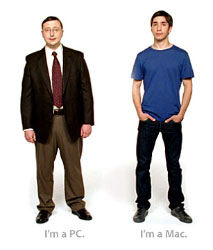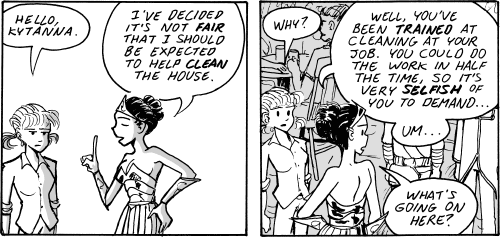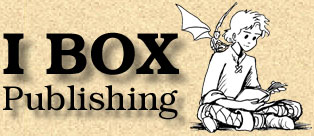|
Hi! Welcome to the next installment of my little exploration into the wild world of eBook publishing and how comics might fit into it all.
I figure if I'm going to have any chance of grasping the whole confused and tangled mess, then the best way to start would be to learn who the various players are. There's a bunch of them! Hardware makers, media vendors as well as the people who make the different operating systems software enabling the media to run on the hardware. Sheesh! So rather than beat around the bush, I can see no better place to start than right at the top of the heap.
With the almighty. . , Apple.
That's no longer, "Apple Computers", mind you. It should be noted now that they're just, "Apple". A subtle shift, but a significant one. This is probably due to the fact that they don't just make and sell technology anymore. They sell phones. They sell music and eBooks. They sell TV shows. And I hope you will forgive me when I ask, "Er, pardon-?"
Where did this monolith come from? How many tens of billions in liquid cash does Apple have stuffed away in their coffers at this very moment? Wasn't Apple broke and on the rocks a decade or so ago? Well, yes, in fact, they were.
I just want to back up here for a brief moment, because this is all a little too surreal for me to accept at face value. . .
So there we are, back in 1983, and Steve Jobs, just a young entrepreneur, (as the popular legend has it), made a successful bid to win over into his fledgling company one of the most powerful executive leaders in the business world of the day, one Mr. John Sculley, then president of PepsiCo. Jobs delivered his apocryphal, "Do you want to spend the rest of your life selling sugar water or do you want to change the world?" and so began his, and Apple Computer's epic journey into corporate stardom.
Of course, whether that "sugar water" quip really happened or not is anybody's guess, but it makes for a rousing story, and given the arc Apple has since cut through human culture, it cannot be doubted the world has indeed been changed. Significantly.
 
In short, and without going into the history, (no need; it's everywhere. Just Google it), Apple Computers had its ups and downs, alternatively making piles of cash, firing Steve, re-hiring him, and nearly going bankrupt in between. Until finally. . , the iPod landed and with it the birth of "Pod" culture. —Which to be fair, had been accelerating toward us ever since Sony first brought the Walkman Tape Cassette Player to market, except where Sony's first release of their device featured two audio jacks (in case people wished to share the listening experience with a friend), Jobs instead recognized the hide-from-humanity coal of masturbatory narcissism we each have within ourselves to some degree, and he fanned it into a bonfire which now, it seems, threatens to consume the world.
Which brings me to my next statement. —I hope you will forgive me if I clear this from my system, because if I don't do it now, I'm going to feel like a big fake:
I don't trust Apple.
It's not their technology, which I happen to think is well-engineered and aesthetically appealing. It's not that at all. No. . , what bothers me is the way Apple changes people. The way they manipulate their users.
You may have heard about the famous Steve Jobs "Reality Distortion Field". . ? No? —Well, the idea is that when Jobs was in the room, he was able to create buzz and confidence far out of proportion with the hard reality of whatever he happened to be selling. Journalists would leave his presentations feeling excited, glowing and dazzled by the wonders Jobs had described, and their writing reflected this.
Distortion Field? Hardly. In the world of advertising and public relations, this is simply called 'Marketing' or 'Perception Management'. Making it sound overly-astonishing or even somewhat magical is just an example of even more marketing. Really, Jobs was simply a very skilled salesman. He knew people, and he knew how to talk to them. He knew how to make them see what he wanted them to see. —And I really don't mind people like that. There are few things I enjoy more than witnessing a salesperson genuinely excited about a well-made and useful product who is able to communicate his or her enthusiasm. In fact, I know several excellent salespeople for whom I have the utmost respect. Though, my respect does not stem from my marveling at their charisma and wit, but rather the thing I respect is that they have chosen, deep down, to use their powers of communication and social weaving in ways which honor life. —That whatever they do, they always genuinely attempt to behave with grace and honor, to make choices which help improve the lot the people around them. Steve Jobs, whatever his intentions were, didn't quite seem to track along those lines.
Now hold onto your hats, because I'm about to go sideways for a minute, (I'll get back to the main point shortly, I promise,) but for now, I want everybody to consider that absolute miracle of biology. . , the human brain.

In particular, I'm interested in the parts of the brain which think and reason versus those which feel strong, chemically derived emotional impulses. Check this out. . .
On page 189 of Barbara Oakley's book (no relation), "Evil Genes", she notes the following:
A recent imaging study by psychologist Drew Weston and his colleagues at Emory University provides firm support for the existence of emotional reasoning. Just prior to the 2004 Bush-Kerry presidential elections, two groups of subjects were recruited --fifteen ardent Democrats and fifteen ardent Republicans. Each was presented with conflicting and seemingly damaging statements about their candidate as well as more neutral targets such as Tom Hanks (who, it appears is a likeable guy for people of all political persuasions). Unsurprisingly, when the participants were asked to draw a logical conclusion about a candidate from the other --"wrong"-- political party, the participants found a way to arrive at a conclusion that made the candidate look bad, even though logic should have mitigated the particular circumstances, and allowed them to reach a different conclusion. Here's where it gets interesting:
When this "emote control" began to occur, parts of the brain normally involved in reasoning were not activated. Instead, a constellation of activations occurred in the same areas of the brain where punishment, pain and negative emotions are experienced (that is in the left insula, lateral frontal cortex, and ventromedial pefrontal cortex). Once a way was found to ignore information that could not be rationally discounted, the neural punishment areas turned off, and the participant received a blast of activation in the circuits involving rewards --akin to the high an addict receives when getting his fix. In essence, the participants were not about to let facts get in the way of their hot-button decision-making and quick buzz of reward. "None of the circuits involved in conscious reasoning were consciously engaged," says Weston. "Essentially, it appears as if partisans twirl the cognitive kaleidoscope until they get the conclusions they want, and then they get massively reinforced for it with the elimination of negative emotional states and activation of positive ones." Interestingly, a more extreme version of this type of behavior may underlie border-line-like splitting.

A completely different process occurred when a participant had no emotional investment at stake, as with statements concerning the "neutral" Tom Hanks. In this straightforward, rational process, only the dorsolateral prefrontal cortex was activated-both Democrats and Republicans were swayed toward reaching the logical conclusion by the mitigating statement. Dorsolateral activation is, notably, the part of the brain most associated with reasoning as well as conscious effort to suppress emotion.
Ultimately, Westen and his colleagues believe that "emotionally biased reasoning leads to the 'stamping in' or reinforcement of a defensive belief, associating the participant's 'revisionist' account of the data with positive emotion or relief and elimination of distress. "The result is that partisian beliefs are calcified, and the person can learn very little from the new data.'" Westen says. Westen's remarkable study showed that neural information processing related to what he terms "motivated reasoning" -- that is, political bias (in this case, at least) -- appears to be qualitatively different from reasoning when a person has no strong emotional stake in the conclusions to be reached.
Barbara's book is well worth reading, and I'm somewhat annoyed with myself for not having scanned several of the diagrams and other passages before giving my copy back to the library. There were several other quotes worth sharing which are both fascinating and relevant to the point but which I no longer have access to. The quote above was clipped from an on-line book review.
Anyway. . .
Here's the thing: Apple's approach to marketing has historically been two-fold; on the one hand, their marketing teams engage people in terms of what their computers are good at doing in a technical sense. That is, creating and saving files. Surfing the web. Crunching numbers. General computer stuff, all packaged in tastefully designed plastic and metal. But that's only half the story. What they're also doing is something no other computer manufacturer on the planet appears to engage in, and that is, Selling a Lifestyle.
Somewhat like car ads, Apple sells a mood, a way of living, a personal identity. —Though they do this much more deeply than any automotive company has ever been able to accomplish. (This is largely due to the interface of every car being virtually identical between brands. Gas, brakes and steering. Switching to another brand of car doesn't usually involve a learning curve. You just hop in and go. A new computer isn't quite like that.)

And what identity have Apple users been told they have? Let's consider for a moment:
Apple users, (as we have been taught), are artistic, eurodite, successful, generally hip and happy people. Further up the hierarchy of the Mac user tree, we find the so-labelled "Geniuses" (says so right on their business cards), who provide tech support. Above them, if we watch the Apple training videos made for iPhone software developers, we meet another order of Apple clerics. Clean-shaven young men who dress and act like Mormon missionaries, and who indeed introduce themselves as, "Evangelists", (just to be clear, I'm really not making that up).
How do I know this? Well, for a while I tried my hand at coding for iPhones; I thought I'd see what was involved in making a digital version of Stardrop. Being new to the programming language, I was eager to watch the videos provided, thinking that it would be much easier to learn how to program with a real human to talk me through it. However, I was baffled by Apple's tutorial videos. It seemed to me that the videos weren't so much teaching how to use the software as I'd come to expect a YouTube tutorial might do, but rather these were more akin to infomercials, advertising how wonderful the iPhone and its software was and not much else. This was obviously both deliberate and carefully coordinated, as was the deliberate attempt to trigger the same psychological buttons religious organizations attempt to push. And this material, Apple was aiming at programmers, not the buying public. It was both peculiar and fascinating. Apple, it struck me, was very interested in getting people to form strong emotional and even spiritual bonds with their computer products.
How exactly does that benefit them? Why is the deep linking of personal identity to a corporate brand tactically clever?
Well, any well-trained public relations/advertiser can explain it to you. The Apple marketing team knows what Barbara Oakley knows; once you link personal and spiritual identity to a product and thereby the ego, you effectively turn off the brain's reasoning circuits. That dorsolateral prefrontal cortex (responsible for logical reasoning), shuts right down and emotional reasoning of the old lizard brain takes over. Once achieved, then forever-after, Apple can do no ill, can sell no lemons, cannot lie, cheat or steal. —Not a bad bit of marketing! And that's Steve Jobs for you, changing the world. Really, truly making people Think Different.

But again, that's simply creepy marketing 101. Apple just happens to do it very well. Why do I even bring it up? Am I out to bash Mac users? Do I love PCs and need to feed my own ego? Pshaw. I've always said that Apple makes good hardware. As a matter of fact, I'm typing on an Apple keyboard right now. —And I certainly wouldn't object to seeing Stardrop available on an iPad.
No. . , the reason I bring it up is that such behavior demonstrates both character and fundamental intent in a person, or in this case, an organization. If Apple is capable and willing to play mind games with people, then that tells us something. I don't really believe a person can truly respect you while at the same time trying to screw with your brain. When people are treated in the same manner as lab rats, then this tells us something. I don't believe you can do honest business with people who don't respect you.
Which brings me alllll the way back to eBook publishing and sales through the Apple iTunes store. And to one of my original questions. Revenue. Who gets how much? How is the pie divided. . ?
When it comes to a business arrangement in media, I've come to look at it this way. . . Anybody, who at the behest of the creator, works to add value to a creative project deserves some of the end reward.
I know the comic book and graphic novel business, so I'll use that example:
Here's how it works:
Let's say a customer has walked into a comic book shop, perused the selection and has decided to buy a $10 graphic novel.
From the cover price of a graphic novel, the Comic Shop Retailer takes 50%. This is fair and reasonable, because the retailer has to pay for physical overhead, employees and shipping costs from the distributor, as well as bear the risk of the book maybe not ever selling. The Retailer really is the front-line super-hero in the comic book business, and they deserve every penny they get.
The book was shipped to the comic shop by the Distributor, who takes around 13% This is fair and reasonable, since the distributor hosts warehousing overhead and employees who receive, sort and ship tons of books every week. They also publish a full-color, inch-thick ordering magazine which lists all the books available that month, and which is provided free of charge to comic shops.
The Publisher (That's me) takes 30%. This pays for printing, production and advertising costs. The publisher is also taking a risk that after fronting these expenses the book might not sell.
The Creator (Also me) takes the remaining 7%. (On average, depending on the publisher).
When everybody is playing fair, each of those parties does honest work, bears real costs and risks, and earns what they deserve.
When we look at Apple, we see that they take 30% (nearly a full third) of the ticket price on any software or eBooks sold through their iTunes App store. Do they earn this? Do they deserve it? Well, to answer that, we can examine how they fit into the work/service stream
Does Apple Create the product? No. This is self-explanatory.
Does Apple Publish the product? No. The production cost of a piece of media is paid for by the media/software publisher.
Does Apple Distribute the product? No. That cost is again borne by the publisher. The end customer downloads directly from the publisher, using bandwidth paid for by the publisher.***
|
***Correction: The above answer should be Yes. With the exception of some streaming content, Apple takes on the bandwidth cost of paid media, including ebooks. The whole second half of this article needs to be read with this in mind.
Does it justify a 30% share? Diamond Comics Distribution takes only 13% and thrives to this day. While exploring this very question, a helpful Mac user referred me to a breakdown of Apple's App store operations as they stood in mid 2010 when App store sales were beginning to really take off. The analyst figured that 1% of every sale went to 'storage and delivery'. Still, Apple has since constructed huge and expensive data centers to handle the media load, so they do bear expenses in this area.
I'll be looking at the question of bandwidth costs in more detail later in this series.
|
Does Apple Retail the product? Yes. But at what cost/risk? How do they earn their percentage?
Well, let's look at what they do: Apple hosts a website with links to the various products. This is not the same as having a real product on a real shelf; they don't have any warehouse space to pay for. It's all digital. Neither do they have to deal with over-stock, returns or damaged goods. But they do have expenses.
Their expenses include bandwidth for free books and Apps, which they host themselves, as well as the maintaining of a team of people who run the day-to-day administration. These operating expenses apparently run into the millions of dollars, and Apple's chief of finances told us back in early 2010 (still at the early stage of their rapidly accelerating sales curve), that they were operating just above the break-even point, and they probably were. This, however, is no longer a credible claim today here in 2012 after having posted revenues of over $4 billion in total sales, 30 percent of which is a cool $1.2 billion since the launch of the iPad App store. Sales continue to climb.
Furthermore. . . It should be recognized that Apple's bandwidth costs on all those free apps it hosts doesn't have the same character a normal expense would carry. In fact, I have trouble seeing it as an expense at all. Indeed, it's a brilliant bit of marketing; free programs and free ebooks are a huge incentive to pull users into the iPad universe. "The first one is always free." And the bandwidth cost of providing that hook, while Apple's name may appear on the check, is nonetheless underwritten by the money brought in by paid apps. In a fairly straight-forward sense, the makers of all that free media are financing their own advertising with a portion of the sales of their goods; a hidden publisher's expense. This is especially so when one considers the countless unpaid creative hours needed to make all of that free content.
Apple doesn't spend a dime on that part. Free advertising at zero risk to Apple, the physical maintenance of which is paid for by the sales generated by all of that free advertising. What a coup!
So what's left?
Well, there are credit card transaction fees Apple must pay to the banks. It's only a few cents per transaction, but it adds up to millions. Though, again, when one considers where that money comes from, it's hard to categorize this expense in the same league as other more pressing retail costs. Credit card transaction fees are not an up front expense like lighting or heat, or rent, which needs to be paid regardless of how much sales volume moves through a bricks and mortar comic shop, (for instance.) A credit card transaction fee only ever comes up when there is a confirmed sale and never anytime else. So there's no risk on that front either.
Well sheesh! What costs and risks and work is Apple undertaking to earn their nearly one-third cut?
I can't think of any. As far as I can see, all Apple does with their App/iTunes store is charge to provide links to content, and then skim 30% of the revenue from the top. We've seen that model before, minus the cash skimming. Apple is essentially running a glorified torrent site. But did those Pirate Bay guys charge a premium for providing links? No. They sold tee-shirts and banner-ads.
One can argue that the benefit Apple provides is the platform. The iPad itself. And while this is true, having created a unified segment of users, it should be remembered that they've already made a (massive) profit from the sale of each tablet to each of those users.
At best, Apple might be considered a kind of agent working on behalf of copyright holders, providing a flock of willing and happy iPad users (and their wallets) to vendors. And in the end, this is what is really going on. Apple is selling perceptions. They sell social-engineering. They make people feel comfortable while herding them toward the cash register.
Thus, Apple has performed a very clever bit of smooth-talk which very few seem to have caught on to. Honest money for honest work? Hardly. Slick presentation, cut-throat game theory and reality distortion? Oh yes. Pass the collection plate. Imagine if eBay took 30% on all sales made through their site. Nobody would stand for it.

Apple appears to lull people into a dream-like cognitively dissonant state where they are vulnerable to exploitation. That's just sneaky, no matter how you slice it. In a business arrangement, I would much prefer that all parties be fully awake and aware of the details of their agreement, and that they all work honestly for the betterment of each other.
I'll come back again later on to look at the more technical side of how comics can work on an iPad or similar device, but there are other players out there I want to examine first. Who can be trusted to give creators a fair shake?
Come back next Friday for Part III. . .
Comics in the New Media: "Up the Amazon without an iPaddle"
Cheers, and have a great week!
-Mark Oakley
|

